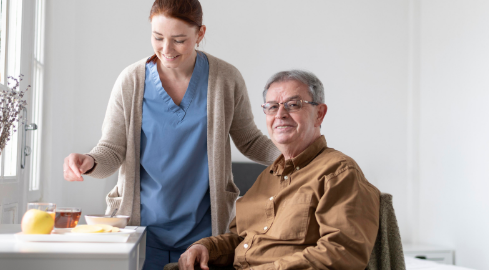Taking care of the elderly is more than just ensuring they’re safe—it’s about making sure their overall well-being is maintained, both physically and mentally. As our loved ones age, they often face challenges that make their day-to-day lives a little more difficult. However, with the right personal care for the elderly, these challenges can be managed effectively, boosting their health and happiness.
Here, we’ll share practical tips to enhance the daily health and well-being of the elderly. Whether you’re a family caregiver or a professional, implementing personal care can ensure a more comfortable and fulfilling life for seniors.
1. Prioritize Good Nutrition
Nutrition plays a vital role in maintaining the health of the elderly. As we age, our bodies change, and proper nutrition becomes even more important. Malnutrition is a common problem among the elderly, which can lead to weakened immune systems and poor recovery from illness.
Here are some ways to ensure elderly loved ones get the nutrition they need:
- Balanced Diet: Ensure they are getting enough vitamins and minerals, especially calcium, vitamin D, and vitamin B12. Include a variety of fruits, vegetables, lean proteins, and whole grains.
- Hydration: Older adults are at higher risk of dehydration. Encourage regular water intake, and offer beverages like herbal teas or soups if they struggle with plain water.
- Small, Frequent Meals: For those with a diminished appetite, consider serving smaller meals throughout the day rather than large ones.
2. Regular Exercise to Improve Mobility
Exercise may seem like an activity for the young, but it is just as important for the elderly. Regular movement can help maintain muscle mass, improve circulation, and keep joints flexible.
Here are some exercise ideas that can fit into daily routines:
- Walking: A daily walk around the block or even in the garden can do wonders for physical health. It promotes cardiovascular health and helps with mobility.
- Chair Exercises: If standing or walking is challenging, chair exercises can help maintain strength without the risk of falling.
- Stretching: Stretching exercises improve flexibility and prevent stiffness. Simple yoga poses or guided stretching routines can be beneficial.
3. Maintain Hygiene and Grooming
Personal care for the elderly often includes regular hygiene routines. Good hygiene not only prevents illness, but it also boosts self-esteem and well-being. For elderly individuals, maintaining a clean and comfortable appearance can significantly affect their mood.
- Bathing: Ensure they bathe regularly, but avoid using overly hot water, which can dry out their skin. Opt for gentle soaps and moisturizers.
- Oral Care: Dental health is essential, so encourage regular brushing and flossing. It may also be helpful to schedule routine dental check-ups.
- Hair Care: Regular haircuts and washing are part of personal care. Consider gentle shampoos and conditioners to protect their hair and scalp.
4. Mental Health and Social Engagement
While physical care is crucial, mental health is just as important for the elderly. Loneliness and depression are common among seniors, so finding ways to engage them socially and mentally is key to overall well-being.
- Socializing: Encourage regular visits from family and friends. Social engagement keeps the mind sharp and improves mood.
- Cognitive Activities: Puzzles, reading, or even playing simple games can help keep the brain active. Consider using technology for video calls to maintain connections with loved ones who may be far away.
- Mindfulness: Meditation and mindfulness practices can help reduce anxiety and increase emotional well-being. Guided apps or simple breathing exercises can be a good starting point.
5. Ensure a Safe and Comfortable Living Environment
A safe home is crucial for maintaining the well-being of the elderly. Accidents can happen, so making sure their living environment is free of hazards is one of the most important aspects.
- Remove Clutter: Ensure the home is free from unnecessary clutter that could cause trips or falls.
- Install Safety Features: Consider adding grab bars in the bathroom, non-slip mats in the shower, and improved lighting in hallways and staircases.
- Comfortable Furniture: Ensure that chairs and beds are comfortable and accessible. A good-quality mattress and cushions can improve sleep and prevent back pain.
6. Monitor Health Regularly
Routine health checks are essential to track changes in health conditions. Regular doctor’s appointments can help identify any medical issues early on, allowing for quicker intervention.
- Medication Management: Many elderly individuals take multiple medications. Keep track of prescriptions and ensure medications are taken correctly.
- Monitor Chronic Conditions: If the elderly person has diabetes, hypertension, or other chronic conditions, monitoring blood pressure, glucose levels, and other indicators can prevent complications.
- Stay on Top of Vaccinations: Ensure that all vaccinations, including the flu shot and pneumonia vaccine, are up to date.
Final Thought
Personal care of seniors is not just about addressing physical needs, but it’s about ensuring they have the support they need to live a comfortable, healthy, and fulfilling life. By focusing on these elements, you can help boost the daily health and well-being of elderly individuals.
Taking proactive steps in these areas will not only improve their quality of life but also provide them with the respect, dignity, and care they deserve.
By embracing these strategies, we can ensure our elderly loved ones remain happy, healthy, and independent for as long as possible.

